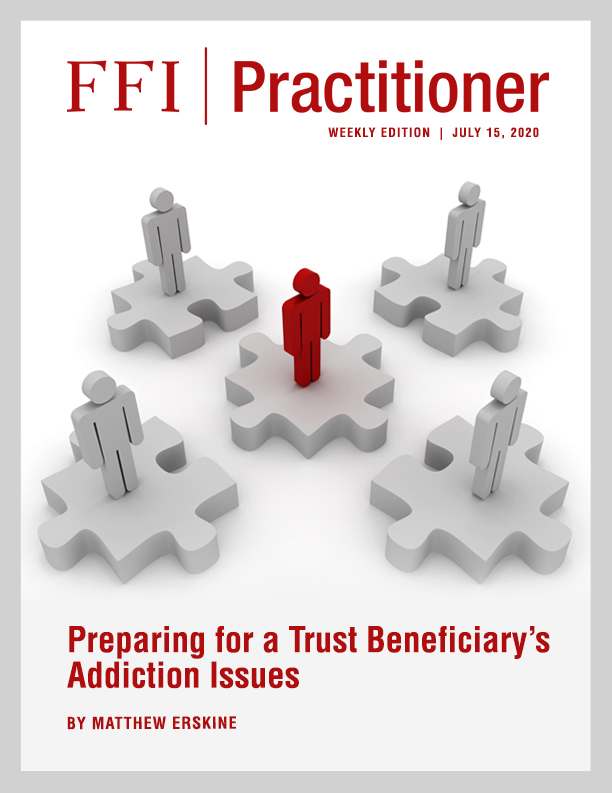
Some experts in the field consider substance abuse as a “pandemic within a pandemic.”2
Even prior to the pandemic, planning for current or future substance abuse of a family member was a dilemma facing those drafting estate planning documents. As an example, in 2017, The World Drug Report3 estimated that a quarter of a billion people worldwide use drugs, with 29.5 million being addicted, and that two billion people globally consume alcohol4, with 76 million affected by alcohol abuse. The current pandemic has widened the substantial gap between the estimated people who need treatment and the places available in specialized treatment facilities. For family enterprise advisors, the likelihood is high that one or more of their clients has, or will have, a beneficiary of a trust that needs treatment and recovery from drug and alcohol abuse.
Filling the gap in available treatment is a public policy issue that ultimately has to be addressed by society, but meanwhile, trusts can be drafted in a way that increase the likelihood of long-term (2+ years) recovery from less than 25% to 92%.
In his paper “Using Leverage to Support Sustained Recovery,”5 William F. Messinger describes how two recovery programs, one for physicians and one for airline pilots, have achieved a long-term success rate as high as 92%. Messinger starts with the premises that: a) drug or alcohol abuse is a chronic illness, not a moral weakness; b) people are vulnerable, not willfully abusing; and, c) the trauma for both the individual and the family continues long after the usual 28 days in treatment. According to Messinger, for a substance abuser to have success in recovery, not only is it necessary to have a supportive family and access to expertise in treatment, but it is also necessary that the recovering addict is accountable for his or her actions, e.g., immediate and significant financial penalties, to maintain compliance with the recovery process. In Messinger’s paper, based on data from physicians and airline pilots, the threat of losing their professional license provides the financial leverage to ensure compliance/success in recovery. For beneficiaries of a trust, the possibility of losing access to income or principal from the trust can be key to the recoverer’s accountability.

“For family enterprise advisors, the likelihood is high that one or more of their clients has, or will have, a beneficiary of a trust that needs treatment and recovery from drug and alcohol abuse.”
Although most trusts have asset protection provisions — the so-called “spend-thrift clause” — trusts must go beyond preventing the beneficiary’s creditors from reaching the assets. The trustee must be authorized, by the term of the trust, to: a) use financial leverage early; b) maintain that pressure for many months; c) find and use qualified experts; and d) provide support even when some financial benefits are cut. This support could include paying for housing, providing support for the spouse and children, and paying for private therapy. Additionally, the trustee must be free to require that the beneficiary agrees to open communication, including drug testing, medical information releases, meetings, and other conduct required in his or her recovery plan. This way, beneficiaries are never completely cut off, but they recognize that harmful behavior has immediate and significant effects.
As a family enterprise advisor, I would like to be able to assure my clients that they will never have a beneficiary who has a substance abuse problem. Statistically, however, that is unlikely. Sooner or later, present or future beneficiaries of a trust will fall victim to this disease and will need three things: family support, access to expertise, and accountability for their behavior. Trusts need to be drafted in such a way that a trustee can provide that accountability through leveraging access to the financial benefits. Consider it as insurance—it may never be needed, but if it is needed, it could save someone’s life.
Disclaimer
The views expressed in this article are those of the author only. The information contained in this article is provided solely for informational purposes. This article does not constitute legal advice or create an attorney-client relationship.
References
1https://www.cbsnews.com/news/how-the-coronavirus-is-hurting-drug-and-alcohol-recovery/
2https://www.ehstoday.com/health/article/21134240/a-pandemic-within-a-pandemic-substance-abuse-rises-amid-covid
3http://www.unodc.org/unodc/en/frontpage/2017/June/world-drug-report-2017_-29-5-million-people-globally-suffer-from-drug-use-disorders–opioids-the-most-harmful.html
4https://www.greenfacts.org/en/alcohol/l-2/01-number-people-affected.htm
5https://oconnorpg.com/wp-content/uploads/2015/07/Leverage-First-Messinger-OConnor.pdf

About the Contributors





